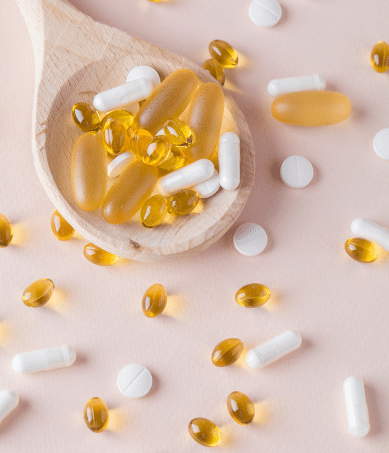This article contains affiliate links to products. We may receive a commission for purchases made through these links. We only recommend products that we believe in and that align with our values and mission.
Hiya Gorgeous!
Has life got you feeling tired lately? Are you battling both mental and physical fatigue? If low energy has you down in the dumps, you’re not alone.
A few years ago, I too was struggling with my energy levels. After implementing a few simple things to dig myself out of the energy rut I was smooshed into, I felt myself begin to thrive again.
But where do you begin?
There are numerous natural ways you can boost energy levels. One way is by making sure you’re getting a varied and balanced diet with all of the wonderful fruits and veggies available to you. Daily movement is also key.
But if a healthy diet and exercise isn’t cutting it, there are a few vitamins and minerals you can try for an energy boost. Certain vitamins and supplements play significant roles in boosting and maintaining energy levels.
Symptoms of Low Energy
So, you’re feeling fatigued 24/7. Are you struggling with some of these other symptoms of low energy levels (perhaps courtesy of insufficient vitamin intake)?
- Muscle weakness, cramps, or loss of muscle mass
- Dizziness
- Mood swings
- Memory loss
- Sleeplessness
- Hair loss
- Infections
What Causes Low Energy?
Low energy can be caused by several factors including:
- Poor diet
- Lack of sleep
- Stress
- Dehydration
Underlying medical conditions such as anemia, thyroid disorders, and chronic fatigue can also exacerbate fatigue symptoms.
Understanding Energy Metabolism
Energy in our body is primarily produced through the breakdown of nutrients, primarily glucose, in a process called cellular respiration, which occurs in the mitochondria. This process produces ATP (adenosine triphosphate), the energy currency of the cell.
Key Vitamins and Supplements for Energy Production
Let’s explore the key vitamins that can help you stay energized throughout the day to get you back to your thriving, gorgeous self.
Important: Always consult your doctor before starting any supplementation regimen to ensure it’s safe and appropriate for your individual health needs.
Vitamin B Complex
The Vitamin B complex comprises eight essential vitamins that are critical for energy and overall health. Each B vitamin plays a unique role in the body, contributing to different aspects of metabolism and energy production.
- B1 (Thiamine): Thiamine helps convert carbohydrates into energy and supports nerve function. Thiamine deficiency can lead to significant fatigue and decreased energy levels due to its role in glucose metabolism (source). Foods Rich in Thiamine include whole grains, sunflower seeds, and legumes.
- B2 (Riboflavin): Riboflavin is involved in energy and cellular function. It helps convert food into energy by participating in the electron transport chain within mitochondria. Foods Rich in Riboflavin include eggs, green leafy vegetables, milk and dairy products, and almonds.
- B3 (Niacin): Niacin plays a vital role in metabolism and helps convert food into usable energy. It is a precursor to NAD+ and NADP+, which are essential for cellular energy production. Mushrooms are rich in Niacin.
- B5 (Pantothenic Acid): Pantothenic acid is crucial for the synthesis of coenzyme A, which is essential for fatty acid metabolism. Avocados, sweet potatoes, and whole grains are rich in pantothenic acid.
- B6 (Pyridoxine): Pyridoxine aids in amino acid metabolism and neurotransmitter production, which are critical for brain function and energy. Foods Rich in Pyridoxine include chickpeas, bananas, and salmon.
- B7 (Biotin): Biotin helps convert fats, carbohydrates, and proteins into energy. Foods Rich in Biotin are Eggs, nuts, and seeds.
- B9 (Folate): Folate is essential for red blood cell formation and energy production. A folate deficiency can lead to iron deficiency anemia and can reduce oxygen transportation, resulting in fatigue.
- B12 (Cobalamin): Vitamin B12 is crucial for red blood cell formation and neurological function, which can impact energy levels. Leafy greens, citrus fruits, and beans are rich in folate.
You can get B12 in various forms. I recommend the Complement Essential multivitamin or Vegan Triple B12 Liquid Spray.
Vitamin B plays a key role in creating Adenosine Triphosphate (ATP) from the food you eat (ATP is the energy source for your cells).
Vitamin B also plays a role in helping your body build red blood cells, which aids with oxygen delivery throughout your body.
Vitamin B even plays a role with the neurotransmitters serotonin and dopamine, which regulate energy and mood in the brain.
So what causes low vitamin B levels? It can simply be part of the normal aging process. Some medications can lower vitamin B levels. But you may simply not be getting enough vitamin B in your diet (vegetarians can get vitamin B from leafy greens and whole grains).
You can get bloodwork done to find out where your vitamin B levels stand. If they’re normal, there’s no point in taking a vitamin B supplement because your body can’t store excess.
Vitamin C
Vitamin C is known for its role in reducing fatigue and boosting the immune system. It is an essential antioxidant that helps protect cells from oxidative stress. Studies find that it can significantly reduce the symptoms of physical and mental fatigue (source).
You can get more vitamin C in your diet by adding in more citrus fruits, kiwi, grapefruits, green and red peppers, potatoes, and much more.
Vitamin D
Over a billion people worldwide have a vitamin D deficiency. Vitamin D is vital for muscle function and overall energy levels. It regulates the functions of over 200 genes and is essential for growth and development (source). A deficiency in vitamin D can lead to fatigue and decreased energy.
So how do we get more of this essential vitamin? The #1 way is sun exposure. 50 to 90% of our vitamin D production is produced by sunshine. What better reason to skip outside and bask in some rays?
If you live in a climate with long winters or your diet is lacking, a vitamin D supplement may be warranted. I suggest getting your vitamin D levels checked annually to make sure it’s at the proper levels.
If you need a supplement, I recommend the Complement Essential multivitamin. It contains 50 mcg (250% RDV) of D3. D3 (cholecalciferol) is the form your body produces naturally when exposed to sunlight.
Vitamin E
Vitamin E supports the immune system, aids in red blood cell production, and acts as an antioxidant, reducing oxidative stress. It’s thought to boost our energy by protecting cells from damage. A vitamin E supplement may improve physical performance and reduce fatigue (source).
To get more vitamin E in your diet, you can consider sprinkling sunflower seeds and almonds on leafy greens, eating more mangoes, or wheat germ oil (which has the highest natural concentration of vitamin E per one tablespoon).
Iron
Iron is essential for the production of hemoglobin, which transports oxygen in the blood. Adequate oxygen transportation is crucial for maintaining energy, and iron deficiency can lead to fatigue. Iron supplementation can improve energy levels and lessen fatigue (source).
There are numerous plant-based foods rich in iron that you can eat more of, including beans, apricots, pumpkin seeds, and spinach. If you are iron deficient and can’t get enough in your diet, iron supplements may be necessary (check with your doc to see where your iron levels are, first).
Ginseng
Ginseng is an oval-shaped root. It’s also an adaptogen that helps the body resist stress and fatigue. fascinating, right? Ginseng has been shown to improve energy, mental clarity, and overall vitality (source).
Coenzyme Q10 (CoQ10)
CoQ10 is an antioxidant that our bodies produce naturally. It’s involved in the production of ATP, the primary energy carrier in cells. It helps improve energy levels, especially in individuals with CoQ10 deficiency. There’s scientific evidence that supports that supplementation improves symptoms of fatigue in people who struggle with chronic fatigue. While mostly derived from animal products (bleh), the best vegan-friendly sources of Coenzyme Q10 include extra virgin olive oil, corn oil, peanut oil, rapeseed oil, and peanuts.
Ashwagandha
Ashwagandha is an adaptogenic herb that helps reduce stress and improve energy levels. It supports adrenal function and can help combat fatigue. Supplemental Ashwagandha has been shown to help decrease anxiety, stress and depression by improving cortisol levels (source). Pregnant women should avoid Ashwagandha supplements because some research suggests it may increase the chance of a miscarriage.
Rhodiola Rosea
Rhodiola Rosea is a plant that is most commonly found growing in Europe and Asia. It’s been used for thousands of years to help humans adapt to cold climates. It’s another adaptogen known for its ability to reduce fatigue and enhance physical and mental performance by increasing the oxygen-carrying capacity of red blood cells.
This should not be taken if you’re on blood thinners or taking a vitamin E supplement, so you need to make sure you get the green light from your doctor on this one.
Melatonin
You likely know melatonin as the hormone that helps you get a good night’s sleep. Why is this in the lineup? Because adequate sleep is crucial for energy restoration and melatonin supplements can help improve sleep quality.
Melatonin—in conjunction with zinc supplementation—was found to reduce fatigue and increase the quality of life for those suffering from chronic fatigue syndrome (source) as well as those dealing with cancer-related fatigue (source).
Magnesium
Magnesium plays a role in over 300 biochemical reactions in the body, including energy production. It helps convert food into energy and is essential for muscle function. Magnesium supplementation improves energy levels and reduces fatigue in individuals with magnesium deficiency (source). Foods rich in magnesium include nuts, seeds, whole grains, leafy green vegetables, and dark chocolate.
Tyrosine
Tyrosine is an amino acid that supports the production of neurotransmitters like dopamine and norepinephrine, which are crucial for mental alertness and energy. Soybeans and sesame seeds are great vegetarian sources of tyrosine.
Other Energy Supplements to Consider
These supplements are associated with exercise performance and can provide energy when the body needs a boost to increase performance naturally.
- Creatine: Creatine helps increase the production of ATP, which provides energy for muscle contractions. It is commonly used to enhance exercise performance and reduce fatigue during high-intensity activities. I recommend Complement Creatine. It uses pure creatine monohydrate, widely considered the gold standard for creatine supplementation due to its proven effectiveness, established safety profile, affordability, and high bioavailability.
- Citrulline: Citrulline is an amino acid that helps increase blood flow and reduce fatigue. It is often used to enhance exercise performance and endurance.
- Beetroot Powder: Beetroot powder is rich in nitrates, which help improve blood flow and oxygen delivery to muscles (enhancing endurance and reducing fatigue).
How do Vitamins and Supplements Work?
Without going too deep into the details, it helps to understand the basics of how some of these vitamins and supplements work to understand their importance in your diet.
Biochemical Pathways
Each vitamin and supplement contributes to energy production through various biochemical pathways. For example, the B vitamins are essential for converting food into energy through their role in the Krebs cycle and electron transport chain. CoQ10 and creatine are involved in ATP production, which is the primary energy currency of cells.
Synergistic Effects
These vitamins and supplements often work together to increase energy levels and enhance your overall health. For instance, the B vitamins work synergistically in energy metabolism, and combining them with other supplements like CoQ10 and magnesium can further support energy production.
Should You Consider Dietary Supplements?
Supplementation may be necessary for individuals with deficiencies, certain health conditions, or dietary restrictions. For example, as vegans and vegetarians, we may need to supplement with B12, as it is primarily found in animal products.
Choosing the Right Supplements
Look for high-quality supplements that have been third-party tested for purity and potency. Consult with healthcare professionals before starting any new supplement regimen to ensure it is appropriate for your specific needs and does not interact with any medications you are taking. Here are my preferred supplements for energy.
Whatever you choose to do, it may help to have a blood panel done to see if you are indeed deficient in any of these vitamins. Supplementing them won’t have an impact (or may have a negative impact) if you don’t have a deficiency.
Secondly, carefully review potential supplements with your primary care doctor to make sure they won’t interfere with any current prescription drugs that you’re taking.
Lifestyle Tips for Maximizing Energy
Whenever possible, try to incorporate a variety of nutrient-dense foods into your diet to ensure you get these essential vitamins and minerals. Leafy greens, nuts, seeds, dairy (if you’re not vegan-leaning), whole grains, legumes, and fruits like citrus and berries are excellent sources of vitamins and minerals.
Many cereals, breads, and dairy products are fortified with essential vitamins, making it easier to meet your nutritional needs through a balanced diet. What else can you do to increase your body’s ability to battle fatigue and increase energy?
- Regular Movement: Physical activity enhances energy levels and overall well-being.
- Adequate Sleep: Prioritize sleep to allow your body to restore energy (here are 10 tips you can use to get better sleep).
- Stress Management: Implement stress-reducing techniques such as meditation, yoga, or deep breathing exercises.
Potential Risks and Side Effects of Supplementation
Make sure you’re aware of the risks associated with consuming excessive amounts of certain vitamins, which can lead to toxicity and adverse effects.
Secondly, though I’ve repeated it multiple times, always, ALWAYS, consult with a healthcare professional before starting any new supplement regimen, especially if you have underlying health conditions. We want to make sure you’re safely improving your energy.
Maintaining optimal energy levels involves a combination of proper nutrition, supplementation, and lifestyle choices. By incorporating the right vitamins and supplements into your routine, you can support your body’s energy production and get back on track to a thriving life.


